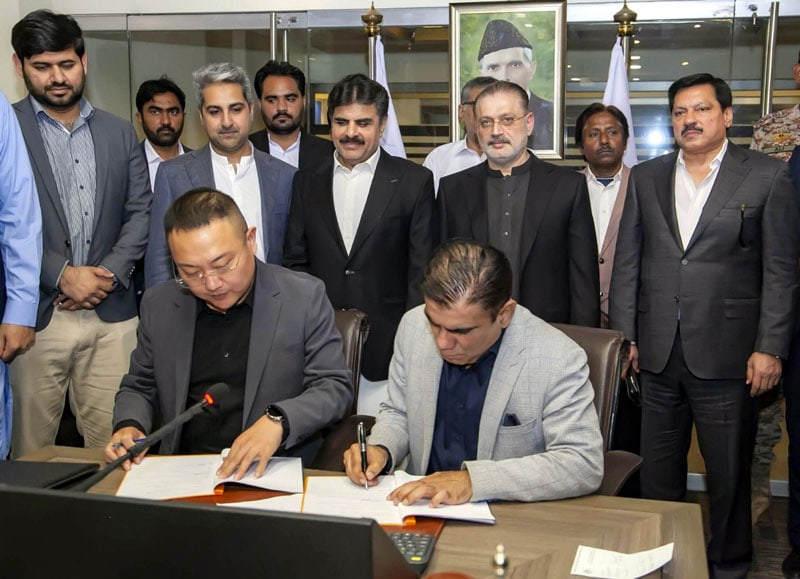In a major step towards enhancing cooperation between Pakistan and China, the Sindh government officials and Chinese high-level delegation, signed memorandums of understanding (MoUs) for five significant development projects in Karachi. These projects cover various sectors including transportation, health, energy, and agriculture. The MoUs involve local assembly of electric cars, solar panel manufacturing, slow-release fertilizers, algae farming, and the establishment of a Medical City in Dhabeji Special Economic Zone.
The signing ceremony was held at the office of Sindh’s Minister for Energy, Sayed Nasir Hussain Shah, and was attended by senior provincial ministers including Sharjeel Inam Memon, the Provincial Minister for Information, Transport, and Mass Transit, as well as Sayed Qasim Naveed Qamar, Special Assistant to the Chief Minister of Sindh on Investment and Public-Private Partnership.
During the ceremony, Senior Minister Sharjeel Inam Memon spoke to the media, highlighting that a Chinese delegation recently visited Sindh, where they met with Chief Minister Sayed Murad Ali Shah. He assured that the Sindh government would provide all possible assistance to Chinese investors seeking to invest in the province. The delegation also met with President Asif Ali Zardari, who reiterated that both the government of Pakistan and Sindh would fully support Chinese investments across various sectors in the country.
Memon emphasized that China-Pakistan friendship was a model of cooperation, with Shaheed Zulfikar Ali Bhutto laying the foundation for strong ties and President Asif Ali Zardari furthering this partnership through the initiation of the CPEC project. He noted that Chinese investors had shown keen interest in sectors such as energy, transport, and health. The delegation was also taken on a tour of the Dhabeji Special Economic Zone, where the Chinese investors expressed interest in establishing industries. Senior Minister Memon further discussed the importance of Public-Private Partnership (PPP) in Sindh, noting the province’s leading role in facilitating large-scale projects under this framework.
He highlighted the success of many major Sindh projects that are being implemented through PPP. Regarding the Medical City project, Memon assured that the Sindh government would provide all necessary facilities to the investors. The government is also planning to launch a green taxi scheme, which would provide employment opportunities for thousands of young people, in line with Chairman Bilawal Bhutto Zardari and President Asif Ali Zardari’s vision for a sustainable, environment-friendly transport solution.
In response to a question, Sayed Qasim Naveed Qamar explained that granite would now be processed locally, rather than being exported for processing in other countries. Speaking about the abundant natural resources in Pakistan, Memon also touched on the thar coal reserves and their potential to produce cheap electricity for the country.
Additionally, Sindh Energy Minister Sayed Nasir Hussain Shah discussed the upcoming fertilizer plant, solar parks, and coal-based electricity projects that would greatly contribute to the energy sector. The solar park projects will aim to produce electricity at a competitive price, with Sindh’s government setting rates. Shah also mentioned issues with K-Electric, stating that despite the federal representation in the company, there is no Sindh representation, which limits the province’s involvement in decisions regarding load shedding and tariff setting.









